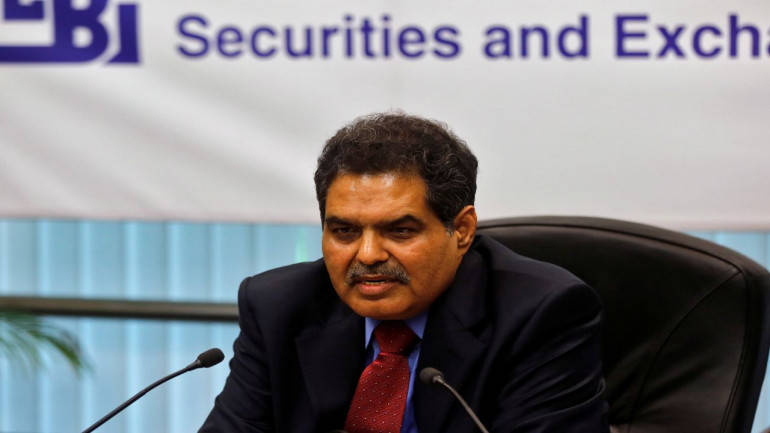The Budget Finance Bill proposed that SEBI board “make a reserve fund, and 25 percent of the annual surplus of the general fund should be credited in this reserve fund” subject to a maximum of two years’ total expenses.
The Securities and Exchange Board of India (SEBI) Chairman Ajay Tyagi has written to the Prime Minister's Office (PMO) and the finance ministry to re-consider the Budget 2019 proposal to transfer surplus funds of the regulator to the consolidated fund of India (CFI).
Tyagi's letter closely follows the July 9 appeal by the SEBI Employee Association (SEA) to the PMO seeking revocation of the proposal on the grounds that it will affect the regulator's autonomy and hamper the securities market functioning.
One of the clauses of the Union Budget Finance Bill presented by Finance Minister Nirmala Sitharaman on July 5 proposed that SEBI board will “make a reserve fund, and 25 percent of the annual surplus of the general fund should be credited in this reserve fund” subject to a maximum of two years’ total expenses. “After incurring all the expenses… and transfer to Reserve Fund… the surplus of the General Fund shall be transferred to the Consolidated Fund of India.” After that, all expenditures would be cleared by the expenditure department of the finance ministry.
The SEBI Act specifies that incomes (annual fees, subscriptions, interest on investments etc) of the regulator are to be credited to a General Fund, from which expenses (salaries, establishment etc) are to be paid. The surpluses, if at all, accrue to the General Fund. As of now, the General Fund totals Rs 2,300 crore.
A source told Moneycontrol “SEBI does not have any mandate to raise revenue for the government. All the penalties levied by SEBI under the SEBI Act, 1992 already get credited to the CFI. SEBI generates its own funding through the levy of fee on market participants by following the principle that regulatory costs should be proportionately borne by those that contribute to the need for regulation or derive benefit from such regulation.”
SEBI employees also believe, effectively, any move to transfer surplus funds of SEBI to the CFI amounts to the fee levied by SEBI becoming a kind of additional tax on market participants.
Another source told Moneycontrol, “SEBI chairman raised concern in front of Prime Minister Office in their last week visit to Delhi."
A Finance Ministry source said, “Department of Economic Affairs has not given much importance to SEBI’s concern."
"It may create a perception that SEBI is not an independent regulator & may also impact capacity building in the everchanging dynamics of the capital market requiring huge investments in physical assets, surveillance, technology & human resources," PK Bindlish former Chief General Manager told Moneycontrol.
The surplus fund transfer issue has been also discussed in the FSDC meeting and a senior official told Moneycontrol, "It was in discussion mode and there was no urgency to come out in budget".
SEBI believes the capital market regulator will practically become a part of the department of Finance Ministry if the proposal is implemented. SEBI employees also believe “this proposal will impinge on the financial autonomy of SEBI as it will have to seek government approval for capital expenditure, which can range from setting up IT infrastructure, expanding the organisational capacity, or any other physical and soft infrastructure that SEBI may require in the light of continuously evolving global securities markets to increase its employee strength.”
“The proposal would result in compromising SEBI’s autonomy and its ability to function effectively towards its stated objectives, and thus, hamper the progress of Indian securities markets,” the SEBI has said in the letter. “Autonomy of a regulatory institution like SEBI is, therefore, critical as it insulates the institution from external compulsions and thus, provides long term continuity in its efforts towards achieving its objectives.”
“The regulator’s autonomy is an important parameter foreign investors take into account before deciding to invest,” a senior SEBI official told Moneycontrol.
Another senior official of the SEBI board added that the financials of the regulator are beyond reproach. The regulator is audited by the CAG, which has not once uncovered any instance of financial imprudence. In the Budget, only SEBI has been singled out for transferring surplus fund and will need expenditure department nod to incur any expenses.
A SEBI official told Moneycontrol that SEBI will not have more than Rs 1,000 crore to transfer to government, “which does not make any large impact on the government’s earnings”.
"It is strange that only SEBI has been singled out,” said Advocate Deepak Sanchety, a former SEBI general manager.
The Finance Bill, being a Money Bill, is typically used to pass tax-related laws, is not voted upon by the Upper House, and proposals can go through with minimal discussion.
The brokers and investors associations are also writing letters to the Finance Ministry and PMO to reconsider the proposal. ANMI has also requested a re-look into the proposal.















